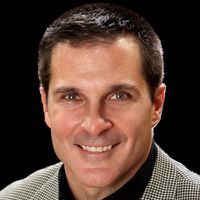5 Action Strategies for Financial Independence
Even those close to retirement can make a few simple moves to secure their futures. From HSAs to creative mortgage-payoff plans, every little bit helps.


Profit and prosper with the best of Kiplinger's advice on investing, taxes, retirement, personal finance and much more. Delivered daily. Enter your email in the box and click Sign Me Up.
You are now subscribed
Your newsletter sign-up was successful
Want to add more newsletters?

Delivered daily
Kiplinger Today
Profit and prosper with the best of Kiplinger's advice on investing, taxes, retirement, personal finance and much more delivered daily. Smart money moves start here.

Sent five days a week
Kiplinger A Step Ahead
Get practical help to make better financial decisions in your everyday life, from spending to savings on top deals.

Delivered daily
Kiplinger Closing Bell
Get today's biggest financial and investing headlines delivered to your inbox every day the U.S. stock market is open.

Sent twice a week
Kiplinger Adviser Intel
Financial pros across the country share best practices and fresh tactics to preserve and grow your wealth.

Delivered weekly
Kiplinger Tax Tips
Trim your federal and state tax bills with practical tax-planning and tax-cutting strategies.

Sent twice a week
Kiplinger Retirement Tips
Your twice-a-week guide to planning and enjoying a financially secure and richly rewarding retirement

Sent bimonthly.
Kiplinger Adviser Angle
Insights for advisers, wealth managers and other financial professionals.

Sent twice a week
Kiplinger Investing Weekly
Your twice-a-week roundup of promising stocks, funds, companies and industries you should consider, ones you should avoid, and why.

Sent weekly for six weeks
Kiplinger Invest for Retirement
Your step-by-step six-part series on how to invest for retirement, from devising a successful strategy to exactly which investments to choose.
If you are in the second half of your career and have a serious eye on being financially independent, there are five things I suggest you consider doing now.
1. Do what you can to be mortgage-free.
Retirees without a mortgage have it much easier than those who did not plan as well. If you have 25 years left on a 30-year mortgage and want to be financially independent or retired in 10 years, then refinance to a 10-year mortgage or add whatever is needed to be paid up in 10 years.
Another mortgage-payoff strategy that I love, but is seldom used, is to create a specific taxable investment account to accrue money in such a way that it would grow to a sum large enough to pay off your remaining mortgage balance in the year you desire. This way, you keep control over that money rather than giving it to the lender, and you maintain a larger interest deduction along the way. The key to this strategy is to have the money automatically saved from your checking account to your mortgage-payoff investment account. Without this automated discipline, the strategy could easily implode.
From just $107.88 $24.99 for Kiplinger Personal Finance
Become a smarter, better informed investor. Subscribe from just $107.88 $24.99, plus get up to 4 Special Issues

Sign up for Kiplinger’s Free Newsletters
Profit and prosper with the best of expert advice on investing, taxes, retirement, personal finance and more - straight to your e-mail.
Profit and prosper with the best of expert advice - straight to your e-mail.
2. Diversify away from your traditional work 401(k).
It usually makes sense to contribute to your 401(k) up to the match percentage, but for many people all of their retirement savings are locked into their 401(k)s or IRAs. The rude awakening for these people is that their account balances are not really all their money. There is a surrender change on the money they withdraw, and it’s called ordinary income tax. It’s whatever income tax rate the government happens to charge when you want your money out. Another potential pitfall to using a 401(k) as a retirement income stream is that Medicare premiums go up as your taxable income goes up. That’s like a tax to me if you pay a higher Medicare premium because your taxable income is higher.
The alternative is to fund AFTER-TAX accounts that generate tax-free or little taxable income. My favorite is the Roth 401(k) if your employer offers it. Your Roth 401(k) contribution is not tax-deductible, but the growth is tax-deferred, and when your contribution and the growth of the account are withdrawn it is income tax-free, as long as you’ve had the account for five years and are at least 59½. Love this. If your income qualifies, you can make a Roth IRA contribution as well and it works the same way.
One more idea is to forgo your traditional 401(k) and set up a tax-efficient investment portfolio with either ETFs, tax-efficient mutual funds or possibly individual stocks and municipal bonds. My point is not to tie up all your money in traditional IRAs and 401(k)s.
3. If you have a qualifying high-deductible medical insurance plan, you definitely should set up and maximum fund a health savings account.
Couples can put away $6,750 in 2017 (plus catch-up contributions of $1,000 more for those 55 and older) and it’s all federally income tax-deductible with no income restrictions. This account grows tax-deferred and the money comes out tax-free if used for qualified expenses. This is truly the best of all worlds. It can be used for Medicare premiums, doctor visits, prescriptions and much more. While this is true, I would not spend my savings from this account unless I absolutely had to. Why would I take money out of an account that has these amazing tax benefits if you could pull from savings and let this account grow?
4. Start planning for your legacy and chronic health care fund both at once right now.
The most efficient asset to leave your family is life insurance. The death benefit is income-tax free and delivered right when needed, guaranteed. I recommend using this vehicle (death benefit) as a permission slip to spend and enjoy the interest AND principal from your investment nest egg rather than preserving your principal until you are too old to enjoy it and figure out that you couldn’t spend it if you tried.
For example, a widowed client of mine wanted to leave her husband’s $400,000 401(k) to her two children. She refused to spend it despite the wishes of her children. To solve this issue, she bought a $400,000 life insurance policy in her 60s. She also takes an annual distribution of $6,000 to pay the premium. Now she is willing to take monthly withdrawals ($1,000/month) from that account knowing $400,000 will be passed on no matter what.
The life insurance you own at retirement frees you up to spend your investment money, not worrying about leaving it behind because the death benefit will fill that void. Ideally, you would construct the premiums to be paid off when you wanted to retire.
5. One of the biggest fears during retirement is the potential cost of chronic care in your old age.
There is a chronic care rider you can purchase with your life insurance that allows you, the insured, to take an advance on your death benefit while you are alive assuming you meet the chronic care rider criteria (usually that you cannot perform two of the six activities of daily living). Many policies let you take up to 4% of the death benefit per month (income tax-free) until you have taken out the entire death benefit. So a $200,000 policy would allow you to take up to $8,000/month. No receipts are needed, and you can spend the money any way you would like. Unlike long-term care insurance where it is “use it or lose it,” whatever you do not spend on chronic care will be passed on to the life insurance policy beneficiaries.
You can be financially independent without incorporating any of these strategies, but I believe strongly that you would be that much better off if you considered implementing each of these. Of course, these strategies are not for everyone and should be considered within the scope of each person’s financial situation.
Profit and prosper with the best of Kiplinger's advice on investing, taxes, retirement, personal finance and much more. Delivered daily. Enter your email in the box and click Sign Me Up.

Brad Rosley, CFP®, has been president of Fortune Financial Group (FFG) since 1996. FFG runs a virtual planning practice working with clients from all over the country. Rosley specializes in helping clients successfully navigate retirement related planning goals and construct investment portfolios to meet their personal life goals. His book "Beyond Money" made the Amazon best-seller list in the summer of 2018.
-
 Nasdaq Leads a Rocky Risk-On Rally: Stock Market Today
Nasdaq Leads a Rocky Risk-On Rally: Stock Market TodayAnother worrying bout of late-session weakness couldn't take down the main equity indexes on Wednesday.
-
 Quiz: Do You Know How to Avoid the "Medigap Trap?"
Quiz: Do You Know How to Avoid the "Medigap Trap?"Quiz Test your basic knowledge of the "Medigap Trap" in our quick quiz.
-
 5 Top Tax-Efficient Mutual Funds for Smarter Investing
5 Top Tax-Efficient Mutual Funds for Smarter InvestingMutual funds are many things, but "tax-friendly" usually isn't one of them. These are the exceptions.
-
 Social Security Break-Even Math Is Helpful, But Don't Let It Dictate When You'll File
Social Security Break-Even Math Is Helpful, But Don't Let It Dictate When You'll FileYour Social Security break-even age tells you how long you'd need to live for delaying to pay off, but shouldn't be the sole basis for deciding when to claim.
-
 I'm an Opportunity Zone Pro: This Is How to Deliver Roth-Like Tax-Free Growth (Without Contribution Limits)
I'm an Opportunity Zone Pro: This Is How to Deliver Roth-Like Tax-Free Growth (Without Contribution Limits)Investors who combine Roth IRAs, the gold standard of tax-free savings, with qualified opportunity funds could enjoy decades of tax-free growth.
-
 One of the Most Powerful Wealth-Building Moves a Woman Can Make: A Midcareer Pivot
One of the Most Powerful Wealth-Building Moves a Woman Can Make: A Midcareer PivotIf it feels like you can't sustain what you're doing for the next 20 years, it's time for an honest look at what's draining you and what energizes you.
-
 I'm a Wealth Adviser Obsessed With Mahjong: Here Are 8 Ways It Can Teach Us How to Manage Our Money
I'm a Wealth Adviser Obsessed With Mahjong: Here Are 8 Ways It Can Teach Us How to Manage Our MoneyThis increasingly popular Chinese game can teach us not only how to help manage our money but also how important it is to connect with other people.
-
 Looking for a Financial Book That Won't Put Your Young Adult to Sleep? This One Makes 'Cents'
Looking for a Financial Book That Won't Put Your Young Adult to Sleep? This One Makes 'Cents'"Wealth Your Way" by Cosmo DeStefano offers a highly accessible guide for young adults and their parents on building wealth through simple, consistent habits.
-
 Global Uncertainty Has Investors Running Scared: This Is How Advisers Can Reassure Them
Global Uncertainty Has Investors Running Scared: This Is How Advisers Can Reassure ThemHow can advisers reassure clients nervous about their plans in an increasingly complex and rapidly changing world? This conversational framework provides the key.
-
 I'm a Real Estate Investing Pro: This Is How to Use 1031 Exchanges to Scale Up Your Real Estate Empire
I'm a Real Estate Investing Pro: This Is How to Use 1031 Exchanges to Scale Up Your Real Estate EmpireSmall rental properties can be excellent investments, but you can use 1031 exchanges to transition to commercial real estate for bigger wealth-building.
-
 Should You Jump on the Roth Conversion Bandwagon? A Financial Adviser Weighs In
Should You Jump on the Roth Conversion Bandwagon? A Financial Adviser Weighs InRoth conversions are all the rage, but what works well for one household can cause financial strain for another. This is what you should consider before moving ahead.